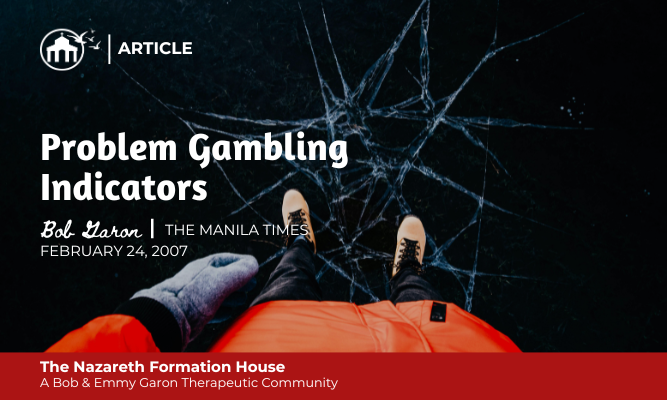Problem Gambling Indicators

Last of two parts
How do you know if and when a loved one has moved from recreational to problem gambling? The experts give us a list of danger signals that are indicators of problem gambling. Here are a few.
An obvious sign is when one increases the frequency and the amount of money gambled. The problem gambler spends an excessive amount of time gambling at the expense of job and family time. This is reflective of his preoccupation with obtaining money with which to gamble. The gambling addict is more interested in the action, the gambling rituals than he is in getting rich. He sees money as the means that allow him to get his highs by participating in the process. This is why, when the gambling addict wins, he does not invest his winnings in savings accounts. On the contrary, he will get into other high-risk adrenaline producing activities, and in a short while, he will be back to the casino to soak up the gambling rituals once again. This is the intense pleasure, an aroused sense of being “in action” that gambling rituals create.
You know a man (woman) is a problem gambler when he goes on gambling despite negative consequences such as large losses, or work or family problems caused by his insatiable appetite to gamble.
Another sure sign is seen when he borrows money to gamble. He may take out loans without informing the family that is shocked to wake up one day to find that he is saddled with huge debts.
When the gambler boasts about his wins, but does not talk about his losses, that is a red flag that indicates a serious prob-lem. He may also experience frequent mood swings, higher when winning, lower when losing.
If he tells himself that he will gamble only a short while and wager only a certain amount of money and ends up doing neither, that too is a sign of loss of control and a serious gambling problem.
Another sign is when the gambler exhibits secretive behavior such as hiding his betting slips or receipts and concealing the extent of his gambling activities.
Countless people gamble, but it becomes a problem, an addiction only when it disrupts his life and the lives of those around him.
When tracing the development of pathological gambling, similarities to the development of substance abuse are apparent.
If not detected and treated early, compulsive gambling might lead to big family and financial problems, and perhaps even legal problems. Compulsive gambling is a chronic condition and is not easy to treat. Left untreated, however, the gambling addict’s problems and those of his loved ones only multiply.
